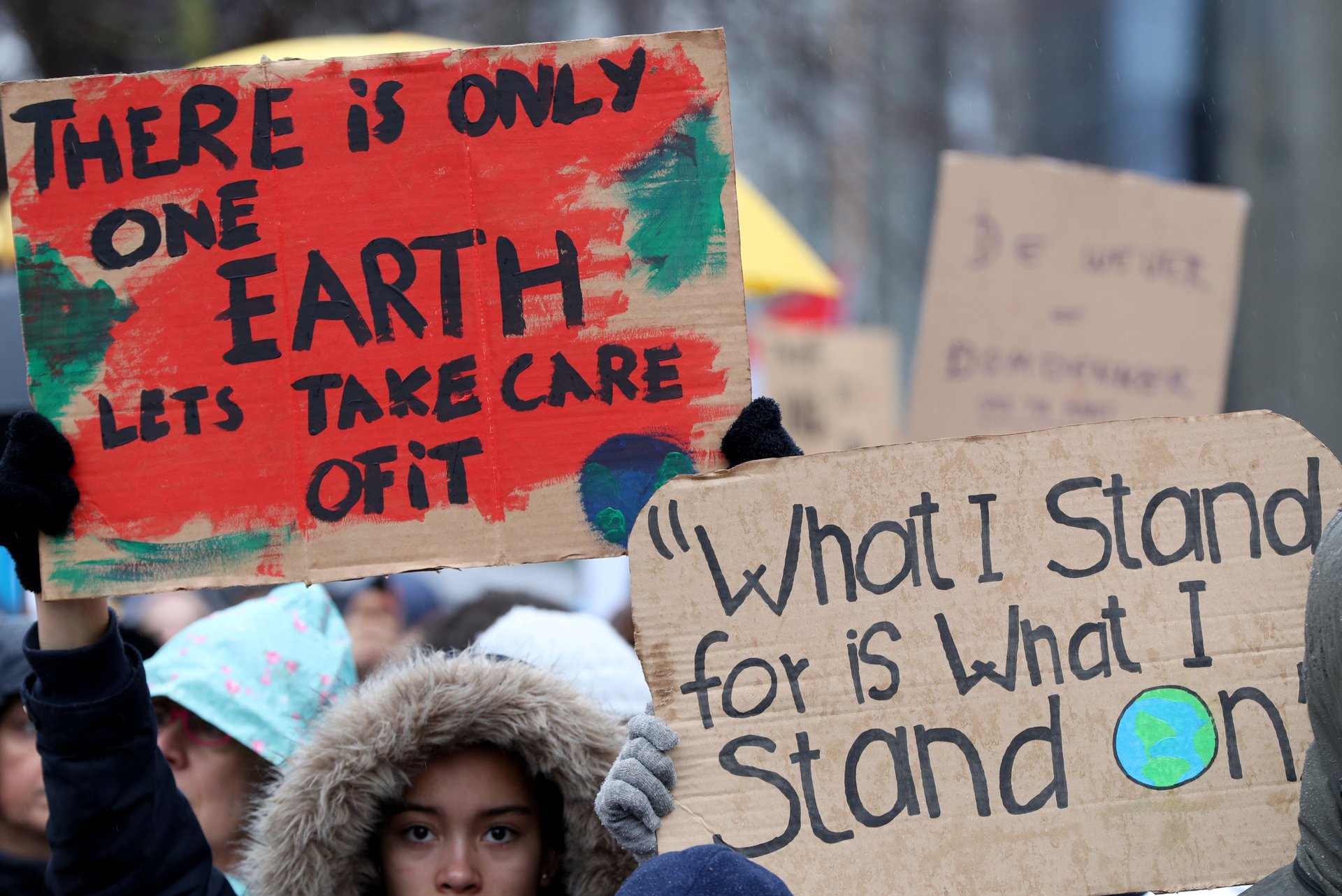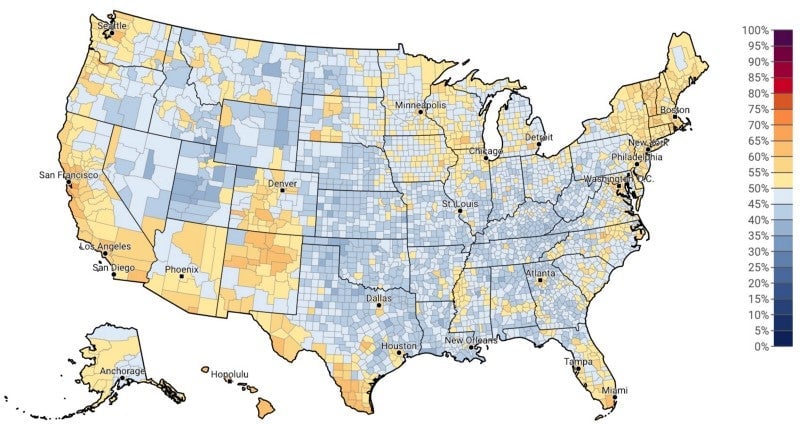The fight against racism shows us how to combat climate denial
Early 20th-century black historian Carter G. Woodson once wrote that schools were places where African-Americans “must be convinced of their inferiority.” He saw that the tools of oppression wielded by white Americans were not limited to billy clubs and poll taxes, but included books, lectures, and tests on US history, which left black students with a diminished view of their role in American life. It was with this in mind that Woodson created Negro History Week, the precursor to Black History Month.


Early 20th-century black historian Carter G. Woodson once wrote that schools were places where African-Americans “must be convinced of their inferiority.” He saw that the tools of oppression wielded by white Americans were not limited to billy clubs and poll taxes, but included books, lectures, and tests on US history, which left black students with a diminished view of their role in American life. It was with this in mind that Woodson created Negro History Week, the precursor to Black History Month.
Woodson belongs to the lineage of black writers, artists, scholars, activists, and elected officials who worked to dispel myths about black pathology, celebrate black achievement, and uproot the entrenched racism that has shaped the contours of American history. Their triumphs are a guide for anyone working to bend the arc of the moral universe a little more toward justice—including anyone working on climate change.
There are important parallels between racism and climate change denial. Both ideologies were cultivated to protect the interests of a wealthy elite, and both continue to undermine the interests of the working class. Both are a form of wilful ignorance, and both might be treated with the same remedy—shame.
The work to curb racism has depended less on good-faith efforts to dispel ignorance and more on enforcing social penalties for racist behavior. The same approach may work for climate change denial. Rather than patiently explain the facts, advocates might do better to chasten climate deniers. As Woodson once wrote, “In our so-called democracy we are accustomed to give the majority what they want rather than educate them to understand what is best for them.” And yet, progress has so often depended on the latter.
“Only three things have successfully disrupted the process of racism formation: law, integration, and social shame,” wrote political commentator Jamelle Bouie in response to a New York Times op-ed calling on white liberals to exercise patience and civility with racists. “If the post-1960s generation of white Americans are more racially egalitarian than their parents and grandparents, it’s because they grew up in a society where the government enforced civil rights laws, states, localities, and civil society institutions took integration somewhat seriously, and open racial bigotry became highly stigmatized… Harsh as it sounds, if you want less racism in your society, you have to show that racism is unacceptable and beyond the pale.”
Last year’s cancellation of Roseanne offers a case in point. The show’s creator and star, Roseanne Barr, sent a racist tweet about former White House aide Valerie Jarrett. ABC, which aired the show, made no attempt to explain the tweet or defend Barr’s character. Network president Channing Dungey called the tweet “abhorrent, repugnant and inconsistent with our values,” while executive producer Sara Gilbert said Barr’s comments “do not reflect the beliefs of our cast and crew or anyone associated with our show.” In distancing itself from Barr, the network enforced the social norm against racism.
Climate advocates might pursue a similar tack. In our age of fierce political tribalism, measured attempts at persuasion have so far failed to end the public grudge match over long-established scientific facts. Thus, while researchers produce report after report detailing the cataclysm to come, Americans remain ambivalent about whether humans are causing climate change. To end the debate, citizens concerned about the steady rise in temperature should decide that climate denial, like racism, has no quarter in the public square. Advocates should call out climate deniers and shame corporations who associate with them. And journalists should refuse to give a platform to climate change denial.

Shame works. In November, Meet the Press invited Danielle Pletka of the American Enterprise Institute on the show to discuss a recent federal report on climate change. Pletka, who is not a scientist, falsely claimed that the previous two years had been the coldest on record, spurring heavy criticism of her booking. The next month, Meet the Press devoted an entire episode to climate change. Host Chuck Todd began the show by saying, “Just as important as what we are going to do this hour is what we’re not going to do… We’re not going to give time to climate deniers. The science is settled, even if political opinion is not.”
Did Todd’s decision to dismiss climate deniers alienate some viewers? Surely. But the fact that many or most Americans embrace a backward idea does not mean that that idea merits consideration. It wasn’t until 1997 that a majority of Americans supported interracial marriage. Did Tim Russert treat opposition to interracial marriage with any seriousness during his tenure on Meet the Press? No.
It is the job of journalists to enforce the bounds of the debate, to remain faithful to the truth and committed to decency, not to reflect what ignorance and fearfulness linger in the American mind. Climate change is a scientific fact. Its denial is an ideology. These are not competing arguments, but competing epistemologies—one rooted in evidence, the other plucked from fantasy.
“The great confrontations of our time are not between scientists, but between individual beliefs and scientific knowledge,” wrote Ibram X. Kendi, director of the Antiracist Research and Policy Center at American University, in a recent essay comparing the denial of racism to the denial of climate change. “How many Americans, as they strive to be balanced and objective and bipartisan, to bring people together, think they can subscribe to both individual disbelief and scientific knowledge? How many Americans believe there are very fine ideas on both sides of these questions? How many Americans ask, ‘Do you think racism is still a problem?’ or ‘Do you believe the globe is warming?’ as if society should value ignorance in the face of scientific certainty.”
When Americans fail to penalize ignorance, ignorance gains currency. In 2015, NBC fired Donald Trump from his role on The Apprentice following his derogatory comments about Mexican immigrants, but the network later invited Trump to host Saturday Night Live. Rather than enforce the social sanction against racism, NBC offered a muddled response, helping to normalize xenophobia. Newscasters commit a similar sin whenever they give equal time to a climate scientist and a climate change denier. Rather than define the terms of the conversation, they are helping to legitimize a conspiracy theory.
Fighting both racism and climate change denial means treating each system of belief as outside the bounds of public debate—too ugly, dangerous, and backward to be validated in the marketplace of ideas. This is a hard line, but a necessary one. Democracy depends on common values and a shared understanding of the truth. Americans cannot entertain falsehoods in the name of balance or bipartisanship.
This post originally appeared on Nexus Media.